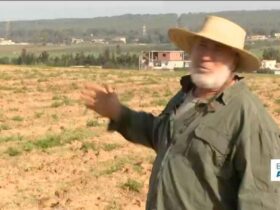In a social media video, a young Russian teenager is seen protesting solo while displaying anti-government slogans, including, “Freedom for political prisoners,” or “I am against Putin.”
We can immediately sense that this boy, Arseny Turbin, only 14 years old at the time, is committed to social justice. But few would have imagined that his courageous, if somewhat naive, activism could in any way threaten the power of Russian President Vladimir Putin.
Yet in a country where dissent is widely cracked down on, such posts – even if they don’t go viral – apparently pose enough of a threat to attract the attention of authorities.
Turbin is currently serving a five-year prison sentence, making him one of Russia’s youngest political prisoners.
Silencing dissidents through imprisonment
Political prisoners in Russia are known as “polizeks”. The term is the title of a new documentary film on the country’s silenced dissidents: “Politzek: Voices that Defy the Kremlin.” Co-produced by DW with France TV, RTBF, VRT and SWR, it will premiere on 27 November.
Directed and written by Manon Loizo, Ekaterina Mamontova and Sacha Koulaeva, the documentary was filmed in secret over the course of almost a year.
At its center are the personal stories of the prisoners, as well as the campaign by families and friends to publish them.
Two prominent activists released in prisoner exchange
Russian artist Sasha Skochilenko is a young woman who was sentenced to seven years in prison for replacing price tags in a supermarket with stickers criticizing Russia’s war in Ukraine.
In “Politzek”, we follow Sasha’s fate through her mother’s campaign to free the young activist.
Similarly, the case of Oleg Orlov is portrayed through various actions taken by his wife Tatiana Kasatkina.
Orlov is a co-founder of the Nobel Peace Prize-winning human rights organization Memorial, which is banned in Russia. In February 2024, he was jailed on charges of “defaming” the Russian military.
Oleg Orlov and Sasha Skochilenko were both released in August 2024 as part of a major prisoner swap between Russia and Western countries.
a ridiculous test
However, many more dissidents remain imprisoned. According to independent monitors ovd informationThere are currently 1,586 political prisoners in Russia.
These include two other women featured in the documentary, theater director Zhenya Berkovich and playwright Svetlana Petrychuk.
He has been found guilty of “justifying terrorism” through a play staged in 2021.
Her work, “Finist, the Brave Falcon”, is about Russian women who are lured to marry Islamic State (ISIS) fighters in Syria. The production, which had a clear anti-terrorist sentiment, won two Golden Masks – Russia’s most prestigious national theater award – and also received support from the Russian Ministry of Culture.
Yet Berkovich and Petrychuk were each sentenced to six years in prison.
The documentary follows their Kafkaesque trial that results in a court verdict that symbolizes the Kremlin’s crackdown on free expression.
Meanwhile, Arseny Turbin, now 17, remains in prison. He has been transferred to a penal colony in Perm, more than 1,800 kilometers (1,120 mi) from his hometown of Livny – making it even more difficult for his mother, Irina Turbina, to visit him. She says her son faced violence from fellow prisoners, which left his mental and physical condition critical.
The film also provides a glimpse into the harsh conditions of Russia’s penal colonies through the work of Anna Kartnikova, a human rights activist and former chief analyst for the Moscow Federal Penitentiary Service.
The power of a support network
“Politzek: Voices that Defy the Kremlin” also showcases the important work of exiled Russian dissidents as they conduct advocacy and aid work for political prisoners jailed in their home country.
Sending letters of moral support to prisoners is also considered important because it reminds them – and the Russian regime – that they are not forgotten.
Such a support network might have prevented the tragic fate of Pavel Kushnir, an accomplished pianist who studied at Moscow’s Tchaikovsky Conservatory.
Kushnir was jailed in a remote Siberian prison for four anti-war videos posted on his YouTube channel, which had only five subscribers.
He died in prison after going on a hunger strike, just four days before a prisoner exchange that would have allowed him to be released, and was widely covered by the media. But no one was aware of Kushnir’s case. After his death noted activists said he was left isolated and without support because there was no local network of dissidents.
Some of his unpublished books and a recording of a piano concert were published posthumously, and he is now remembered as an anti-war icon.
Like prominent Putin critic Alexei Navalny, who also died in the penal colony, these activists leave behind a legacy of resistance — even in death — for many who hope to see their country freed from authoritarianism.
“Politzek: Voices that Defy the Kremlin” dw documentary on December 6 and within the next week on DW Arabic, Spanish, Indonesian And Hindi Documentary Channel.
Edited by: Stuart Braun






Leave a Reply